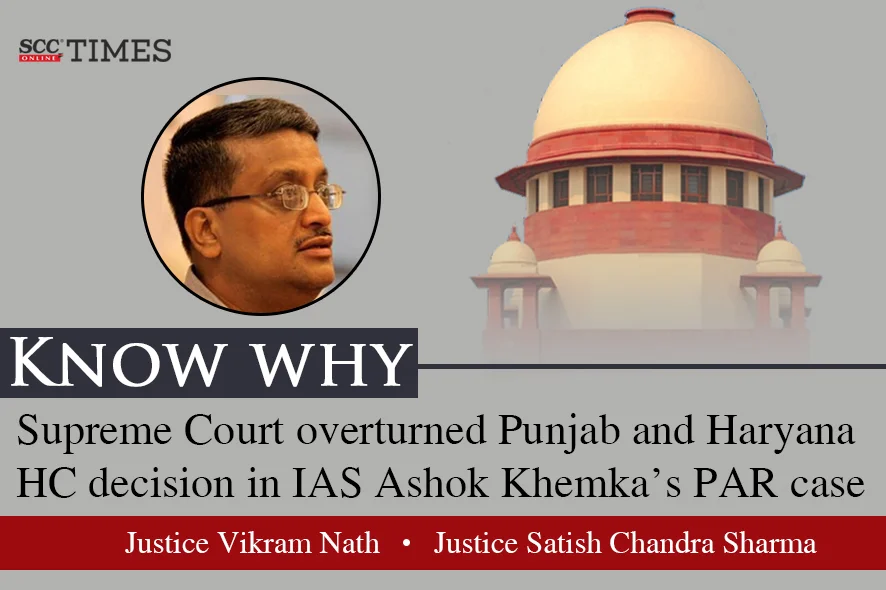Supreme Court: In an appeal by State of Haryana challenging order dated 18-03-2019 passed by Punjab and Haryana High Court setting aside the order of Central Administrative Tribunal (‘CAT’), the Division Bench of Vikram Nath and Satish Chandra Sharma, JJ. set aside the impugned judgment and directed the Chief Minister of Haryana being the Accepting Authority to decide on Underlying Representation within 60 days.
Factual Background
On 7-06-2017, Indian Administrative Services (‘IAS’) of 1991 batch — Ashok Khemka submitted his self-appraisal form qua annual performance appraisal report envisaged under the All-India Services (Performance Appraisal Report) Rules, 2007 (‘PAR Rules’) for the period 8-04-2016 to 31-03-2017. On 8-06-2017, Khemka was appraised by the Reporting Authority – the Chief Secretary, Government of Haryana, and was awarded an overall grade of 8.22, however, a divergent view was taken by the Reviewing Authority (Health Minister of Haryana) on 27-06-2017 who upgraded his grade to 9.92. On 31-12-2017, the Accepting Authority – Chief Minister of Haryana rejected the same and downgraded Khemka’s overall grade to 9 in the PAR, which led him to make a representation under Rule 9(2) of PAR Rules seeking reversal of action by Accepting Authority and restoration of grades awarded by Reviewing Authority, but no decision was taken on Underlying Representation.
Due to inaction in Underlying Representation, Khemka approached CAT, which in turn dismissed the same and relied upon Rule 5(1) of PAR Rules read with Paragraph 9.4 of Appendix -II of the ‘General Guidelines for Filing-Up the PAR Form for IAS Officers Except the Level of Secretary or Additional Secretary or Equivalent to the Government of India’. Khemka approached the High Court through a writ petition wherein the High Court set aside the CAT order highlighting the Accepting Authority’s failure to appreciate various practical constraints faced by Khemka, an upright, intelligent and honest officer, in the discharge of his duties, acknowledged Reviewing Authority’s revision of overall grading in a transparent, fair and reasoned manner and highlighted the pendency of Underlying Representation, and ultimately restored the overall grades and remarks awarded by the Reviewing Authority.
Court’s Analysis
The Court hinted towards the contravention of key timelines under the PAR Rules vis-à-vis the dates of actual compliance by the relevant authorities and highlighted the delay of 184 days on part of the Accepting Authority. The Court further considered the effect of a contravention of the timelines prescribed under the Schedule in view of Rule 5(1) of the PAR Rules and referred to Bhavnagar University v. Palitana Sugar Mill (P) Ltd., (2003) 2 SCC 111 and May George v. Tahsildar, (2010) 13 SCC 98 hinting at the mandatory nature of obligation.
The Court after perusing the relevant provisions of PAR Rules expressed that “a contravention of the said timelines, neither render the underlying PAR invalid, nor would be met with any identified immediate consequence” and mentioned empirical dataon previous performance of Khemka admittedly but within the period prescribed under Rule 5(1) of the PAR Rules.
The Court rejected the contention that the Accepting Authority was precluded from populating its comments after cut-off date, or that the comments of Reviewing Authority would be deemed to have been adopted by the Accepting Authority. The Court found that the Accepting Authority had met the timelines prescribed under Rule 5(1) of the PAR Rules and found no reason to expunge the remarks and overall grades awarded to Khemka by the Accepting Authority on the PAR Rules on account of a contravention of the timelines prescribed under the Schedule.
On the question of whether the High Court could interfere with the CAT Order while exercising its jurisdiction under Article
The Court noted that Khemka was awarded an overall grade of 9 which undisputedly formed a part of the ‘outstanding’ grade, the highest category awarded to an IAS officer. It said that “in our opinion there can be no qualm that the said overall grade is more than sufficient for the purposes of empanelment/promotion”. It further expressed that “The overall grading and assessment of an IAS officer requires an in-depth understanding of various facets of an administrative functionary such as personality traits, tangible and quantifiable professional parameters which may include inter alia the competency and ability to execute projects; adaptability; problem-solving and decision-making skills; planning and implementation capabilities; and the skill to formulate and evaluate strategy. The aforesaid indicative parameters are typically then analyzed by adopting a specialized evaluation matrix and thereafter, synthesized by a competent authority to award an overall grade to the candidate at the end of the appraisal / evaluation.”
The Court was of the view that the process of evaluation of an IAS officer, more so a senior IAS officer entailed a depth of expertise, rigorous and robust understanding of the evaluation matrix coupled with nuanced understanding of the proficiency required to be at the forefront of the bureaucracy, and that the administrative oversight ought to be left to the executive for possessing the requisite expertise and mandate. Thus, according to the Court, the High Court entered a specialized domain while the Accepting Authority was yet to pronounce its decision.
Therefore, the Court set aside the impugned judgment of the High Court and directed the Accepting Authority to take a decision on the Underlying Representation under Rule 9(7B) of PAR Rules within 60 days.
Image Source: @AshokKhemka_IAS / X.com
[State of Haryana v. Ashok Khemka, 2024 SCC OnLine SC 258, decided on 11-03-2024]
Judgment by: Justice Satish Chandra Sharma
Know Thy Newly Appointed Supreme Court Judge | Justice Satish Chandra Sharma
Advocates who appeared in this case :
For Petitioners: Senior Advocate Mukul Rohtagi, Senior Additional Advocate General Lokesh Sinhal, Senior Additional Advocate General Alok Sangwan, Advocate General Dr. Hemant Gupta, Advocate on Record Samar Vijay Singh, Advocate Sumit Kumar Sharma, Advocate Nikunj Gupta, Advocate Rajat Sangwan, Advocate Vaibhav Yadav, Advocate Payal Gupta, Advocate Shivang Jain, Advocate Nitikaa Guptha, Advocate Monica Anand Kumar, Advocate Keshav Mittal, Advocate Sabarni Som, Advocate Himanshi Sakhya
For Respondents: Advocate on Record Ambhoj Kumar Sinha, Advocate Shreenath Khemka







